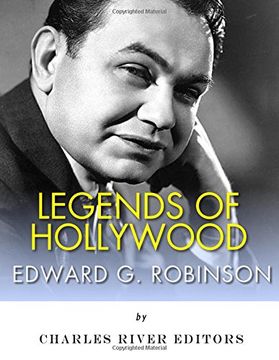Legends of Hollywood: The Life and Legacy of Edward g. Robinson (en Inglés)
Reseña del libro "Legends of Hollywood: The Life and Legacy of Edward g. Robinson (en Inglés)"
*Includes pictures *Includes a bibliography for further reading “I know I'm not much on face value, but when it comes to stage value, I'll deliver for you.” – Edward G. Robinson For most enthusiasts of film history, Edward G. Robinson’s name is virtually synonymous with the Depression-era gangster films of the 1930s. After all, Robinson starred in Little Caesar (1931), which was one of the first major gangster films and is perhaps the most representative example of the genre. Little Caesar remains his most iconic gangster role, but he acted in several other notable gangster films over the course of the decade, including The Little Giant (1933) and A Slight Case of Murder (1938). Even during the 1940s, after the gangster genre had ceded much of its standing to the postwar film noir genre, Robinson retained his ties to gangster films, memorably playing gangster Johnny Rocco in Key Largo (1948). With his short, round physique and irascible screen persona, Robinson became a kind of cinematic brother to James Cagney, and the two remain the most famous of the Hollywood gangster stars. As much as Robinson’s fame remains attached to the rise of the gangster films of the 1930s, it also is important to recognize that he was successful in progressing into the postwar noir films—a genre that bears important similarities with the gangster genre but reworks it in significant ways. Indeed, Robinson starred in what may have been the most famous gangster picture – he played a memorable role in Double Indemnity (1944), which may well be the most famous noir movie ever made. Edward established his status as a worthy noir actor by starring in a duo of underrated Fritz Lang films—The Woman in the Window (1944) and Scarlet Street (1945)—as well as the Orson Welles movie The Stranger (1946). As his memorable noir performances demonstrate, Edward G. Robinson was more than just a famous gangster villain. He represents someone who was able to successfully navigate the changes in Hollywood cinema from the 1930s through the following decade. Interestingly, even as Robinson became a star on the screen, events off screen also made him abdicate his lofty standing. A first-generation immigrant who moved to the United States from Romania while still a child, Robinson’s rise in the entertainment industry—first on stage and then in Hollywood—embodied the Horatio Alger myth of a self-made man. Lacking the conventional attractiveness that characterized most male actors (particularly leading men), it was through his sheer skill and virtuosity that Robinson was able to fashion a successful career. However, if Robinson benefited early in his career from the opportunities presented by Hollywood, it was also at the hands of the industry that his career was compromised during the early 1950s through the efforts of the House Un-American Activities Committee (HUAC). Although he was not a member of the Hollywood Ten, Robinson was a suspected Communist, and his name was tarnished within the acting community and in the eyes of the American public. He would continue to act through the end of his life, but his days as a major figure in Hollywood were brought to an abrupt end. Legends of Hollywood: The Life and Legacy of Edward G. Robinson analyzes Robinson’s career in the 1930s and 1940s, as well as his real life roles as Hollywood star and victim.. Along with pictures and a bibliography, you will learn about Edward G. Robinson like never before, in no time at all.

